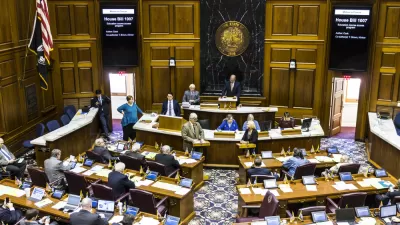Now that voters have decisively rejected a sales tax measure that would have also hiked the gas tax, House representatives have proposed eliminating the state's Earned Income Tax Credit that benefits the working poor to help pay for roads.
Michigan legislators are getting desperate to find funding to address the state's "terrible roads" after voters rejected Proposition 1 by a 80 percent to 20 percent margin last month. We knew they were planning to resort to using so-called surplus general funds for roads, but the extent of diversion is truly surprising and upsetting to some public policy experts.
"The Michigan House approved a plan to shift hundreds of millions of dollars from the state's general fund and make other changes aimed at putting nearly $1.2 billion a year toward repairing the state's roads," writes Brian McGillivary of the Traverse City Eagle-Record. "Lawmakers also found $117 million through the elimination of the state Earned Income Tax Credit."
"The Michigan Earned Income Tax Credit lets working families who earn low wages or who have fallen on hard times keep more of what they earn to afford the basics," according to the Michigan League for Public Policy.
Eliminating the EITC to pay for roads amounts to robbing Peter to pay Paul. The $117 million saved by eliminating the credit is a drop in the bucket of a $1 billion plus transportation plan, but a huge amount to families who need the credit to make ends meet.
Democrat Jon Hoadley of Kalamazoo described the elimination of the EITC as "filling potholes at the expense of the poor," reported CBS Detroit.
To be sure, the "House road package" [PDF] does include increases in user fees, though not the gasoline tax, reports McGillivary.
The plan would raise the diesel tax to 19 cents from 15 cents to match the gas tax and index both taxes to inflation. Registration fees would be raised by $30 on certain hybrid vehicles and by $100 on electric vehicles.
The largest amount of funds in the House road plan will come from the diversion of income tax funds according to the House fiscal agency memo [PDF]. Rather ironically, the plan also diverts tobacco settlement revenue so motorists can drive on better roads.
Doug Rothwell of Business Leaders for Michigan called for "a permanent, long-term solution to increase road repair funding without raiding the General Fund and hurting other critical priorities that are important to our economy," he told CBS. "The revenue should come from the users of our roads and bridges and be sufficient to ensure good quality road and bridge conditions."
FULL STORY: House diverts money toward roads

Depopulation Patterns Get Weird
A recent ranking of “declining” cities heavily features some of the most expensive cities in the country — including New York City and a half-dozen in the San Francisco Bay Area.

California Exodus: Population Drops Below 39 Million
Never mind the 40 million that demographers predicted the Golden State would reach by 2018. The state's population dipped below 39 million to 38.965 million last July, according to Census data released in March, the lowest since 2015.

Chicago to Turn High-Rise Offices into Housing
Four commercial buildings in the Chicago Loop have been approved for redevelopment into housing in a bid to revitalize the city’s downtown post-pandemic.

New Park Opens in the Santa Clarita Valley
The City of Santa Clarita just celebrated the grand opening of its 38th park, the 10.5-acre Skyline Ranch Park.

U.S. Supreme Court: California's Impact Fees May Violate Takings Clause
A California property owner took El Dorado County to state court after paying a traffic impact fee he felt was exorbitant. He lost in trial court, appellate court, and the California Supreme Court denied review. Then the U.S. Supreme Court acted.

How Urban Form Impacts Housing Affordability
The way we design cities affects housing costs differently than you might think.
City of Costa Mesa
Licking County
Barrett Planning Group LLC
HUD's Office of Policy Development and Research
Mpact Transit + Community
HUD's Office of Policy Development and Research
City of Universal City TX
ULI Northwest Arkansas
Town of Zionsville
Urban Design for Planners 1: Software Tools
This six-course series explores essential urban design concepts using open source software and equips planners with the tools they need to participate fully in the urban design process.
Planning for Universal Design
Learn the tools for implementing Universal Design in planning regulations.






















